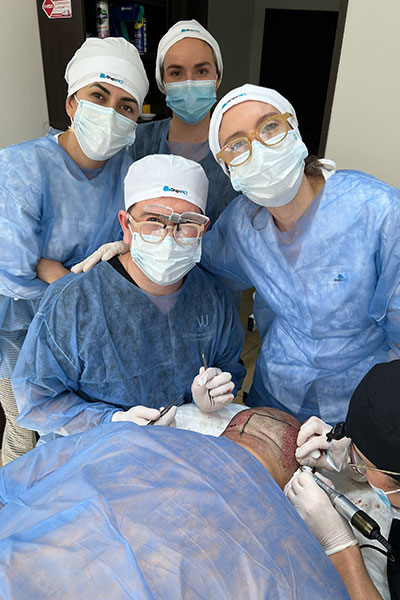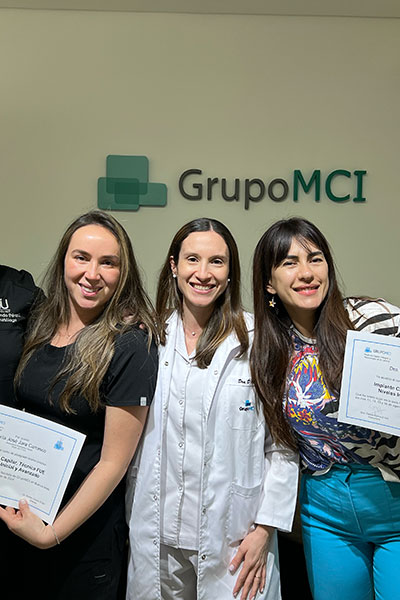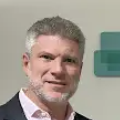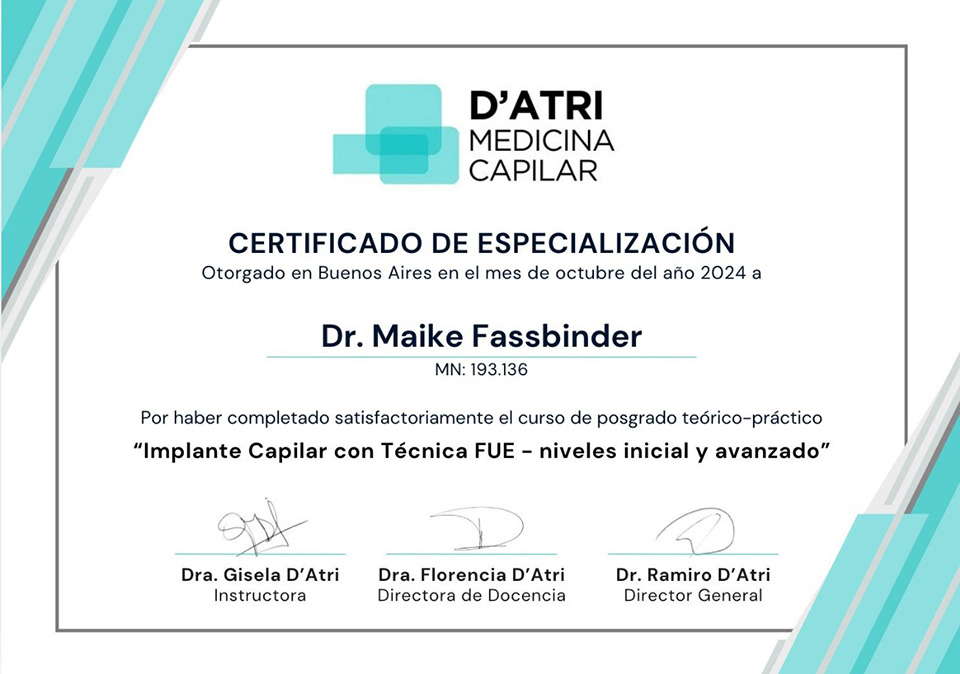Specialization Course
Theoretical Course on Non-Surgical Hair Treatment
Learn from specialists with more than 15 years of experience in a course designed to help you master the technique in a practical and effective way.
Our courses
Non-Surgical Hair Treatment
We offer personalized and intensive courses, carefully designed for optimal transmission of theoretical knowledge and acquisition of practical skills.



"It's important to us to establish close, direct contact with our students. Learn more by reading the content on this website, then contact us directly to answer any questions or register."

Dr. Ramiro D'Atri
Managing Partner of D’Atri Medicina Capilar
Degree
Diploma issued by D’Atri Capillary Medicine, certifying the Theoretical training in Non-Surgical Hair Treatment.
Description
Syllabus
Goals
Requirements
Registration
Duration
Description
Description of the Non-Surgical Hair Treatment Theoretical Course
The Non-Surgical Hair Treatment Theoretical Course is an online educational program taught by international expert Gisela D’Atri. The specialization is designedexclusivelyfor professionals who have already completed ourInitial Theoretical and Practical Course.This theoretical training in hair treatments is given to both doctors and health professionals who seek to specialize in non-surgical treatments for alopecia and other hair conditions. This course offers comprehensive and up-to-date training in the field of non-invasive hair medicine, covering everything from theoretical foundations to the latest therapeutic innovations. Taught by renowned experts in trichology, the course covers the full spectrum of medical, pharmacological, and advanced therapies for hair loss. Participants will acquire in-depth knowledge of drugs and medical therapies used in the management of various hair disorders, enhancing their clinical and professional skills. Course starts: May 2025.Syllabus
Syllabus for the Theoretical Course on Non-Surgical Hair Treatment
Module 1: Fundamentals of Hair Medicine
- Anatomy and Physiology of the Hair Follicle:
- Structure and hair growth cycle.
- Molecular biology and genetics of hair.
- Pathophysiology of Alopecia:
- Etiopathogenic mechanisms of the main types of alopecia.
- Hormonal, immunological, and environmental factors.
Module 2: Clinical Diagnosis and Advanced Trichology
- Clinical Evaluation of the Hair Patient:
- Clinical history and detailed physical examination.
- Diagnostic Tools:
- Trichoscopy and other imaging techniques.
- Laboratory tests and scalp biopsy.
Module 3: Systemic Pharmacological Treatments
- 5-Alpha Reductase Inhibitors:
- Finasteride and Dutasteride:
- Mechanisms of action, dosage, and management of side effects.
- Finasteride and Dutasteride:
- Systemic Antiandrogens:
- Spironolactone and Flutamide:
- Indications and therapeutic protocols.
- Spironolactone and Flutamide:
- Immunomodulators and Biological Therapies:
- Use of systemic corticosteroids and immunosuppressants.
Module 4: Topical Treatments and Hair Lotions
- Topical Minoxidil:
- Pharmacodynamics, formulations, and usage guidelines.
- Formulations Magisterials:
- Customized combinations of topical medications.
- New Therapeutic Agents:
- Prostaglandins, melatonin, and other emerging compounds.
Module 5: Injectable Therapies and Non-Invasive Procedures
- Hair Mesotherapy:
- Administration techniques and substances used.
- Platelet-Rich Plasma (PRP):
- Scientific foundations and application protocols.
- Dutasteride and Other Drug Microinjections:
- Efficacy and clinical considerations.
Module 6: Physical Therapies and Advanced Technologies
- Low Level Laser Therapy (LLLT):
- Mechanisms of action and clinical evidence.
- Electrotrication and Microneedling:
- Procedures and benefits in hair regeneration.
- Phototherapy and Light Therapies:
- Applications and results in alopecia Specific.
Module 7: Nutrition and Supplementation for Hair Health
- Role of Nutrition in Hair Loss:
- Common Nutritional Deficiencies.
- Supplements and Essential Vitamins:
- Biotin, zinc, iron, and other micronutrients.
- Diet and Lifestyle:
- Impact on hair health and practical recommendations.
Module 8: Comprehensive Patient and Case Management Clinical
- Multidisciplinary Approach:
- Coordination with endocrinologists, nutritionists, and psychologists.
- Expectation Management and Treatment Adherence:
- Effective communication and patient follow-up.
- Clinical Case Analysis:
- Interactive discussion and problem-solving.
Goals
Objectives of the Theoretical Course on Non-Surgical Hair Treatment
Upon completion of the course, participants will be able to:- Understand in depth the theoretical foundations of hair medicine and the causes of various types of alopecia.
- Make accurate diagnoses using advanced techniques and tools in trichology.
- Implement effective non-surgical treatments, based on scientific evidence, to manage hair loss and other hair conditions.
- Appropriately prescribe and manage different drugs and medical therapies, including possible side effects and contraindications.
- Develop comprehensive treatment plans, considering nutritional, psychological, and lifestyle aspects.
- Update themselves on innovations and emerging technologies in the field of hair loss. non-invasive hair medicine.
Requirements
Requirements for the Non-Surgical Hair Treatment Theoretical Course
- Medical or Healthcare Professional Degree: Aimed at physicians, dermatologists, trichologists, and other related professionals.
- Interest in Non-Surgical Hair Medicine: Desire to specialize and delve deeper into non-invasive medical treatments and therapies.
- Access to Virtual Platform: The course is completely online; a stable internet connection and a compatible device are required.
- Basic Knowledge of Hair Medicine: A background in hair anatomy and physiology is recommended.
Registration
Registration for the Non-Surgical Hair Treatment Theoretical Course
Registration Process
- Complete the Registration Form:
- Go to our website and fill out the form with your personal and professional information.
- Submit the Required Documentation:
- Copy of your professional degree and registration.
- Updated CV.
- Make the Registration Payment:
- Follow the instructions to make the payment and secure your spot.
- Registration Confirmation:
- You will receive an email with Confirmation and access to the course platform.
Payment Methods
- Course Cost:
- Consult via WhatsApp (includes access to all materials and certification).
- Payment Options:
- Credit/Debit Card.
- International Bank Transfer.
- Secure Online Payment through our platform.
- Payment Options:
- Installment Plan:
- Possibility of financing in 3 or 6 interest-free payments.
- Installment Plan:
- Special Discounts:
- 10% discount for early registration.
- Group discounts for institutions or groups of 3 or more professionals.
- Email: contacto@datrimedicinacapilar.com
- WhatsApp: +54 9 11 2356-8720
- Phone: Calls to the same number.
- Business Hours: Monday to Friday from 9:00 a.m. to 6:00 p.m. (GMT-3)
Duration
Duration of the Non-Surgical Hair Treatment Theoretical Course
- Modality: 100% online with live classes and access to recorded material.
- Total Duration: 1 month.
- Start Date: February 2025.
Frequently Asked Questions
What type of degree or diploma do I receive?
Upon completion, doctors will receive a certificate issued by D’Atri Medicina Capilar as specialists in FUE hair transplant technique, while other healthcare professionals, such as nurses, will obtain certification as trained assistants in the FUE hair transplant technique.
What are the available dates for upcoming FUE Technique courses?
The Theoretical-Practical FUE Technique Hair Implant Courses are usually held on Tuesdays, Wednesdays, Thursdays and Fridays of the second or third week of each month. Below are the confirmed dates:
- 2024 Calendar:
- November: 12-15
- December: 10-13
- 2025 Calendar:
- January: 14-17
- February: 11-14
- March: 11-14
- April: 8-11
Who can participate in the FUE Technique training course?
The D’Atri Hair Medicine training program in the FUE technique is aimed at both physicians and other healthcare professionals, such as nurses, surgical instrument technicians, and other specialists in the field.
It is essential that participants provide proof of their healthcare degree, since performing a hair transplant requires the supervision of a responsible physician, assisted by trained healthcare personnel.
Nurses and other professionals can participate in the course and, upon completion, will receive an assistant certificate. The training activities are similar for all participants and focus on intensive, practical learning.


